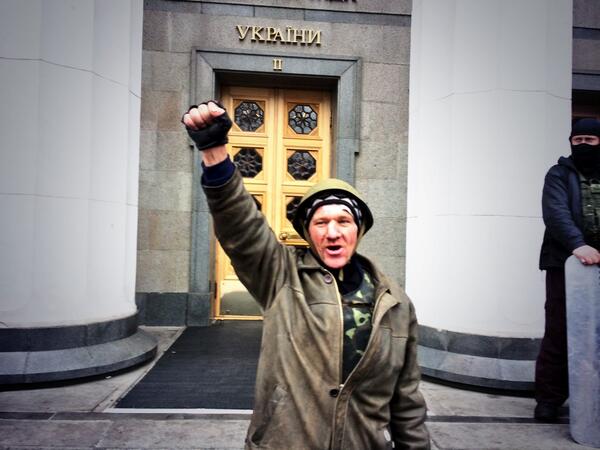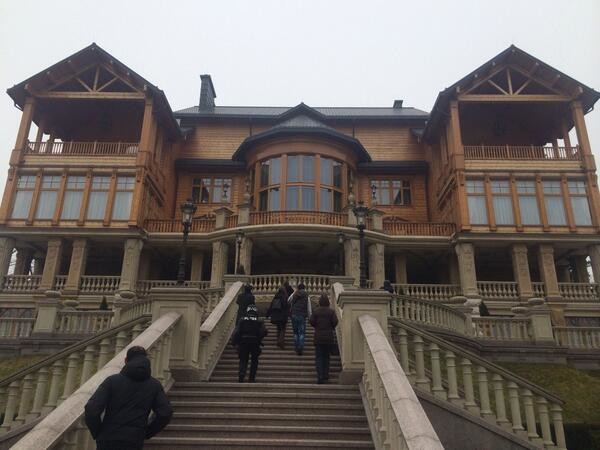The cynics will soon forget it if they
have not already, but three years ago, on February 22, 2014, the
citizens of Kiev, Ukraine, were having a very strange morning. They
had awoken to expect noise and bloodshed, but what they found instead
was deserted streets, empty buildings, and peace.
And hope.
The story starts months earlier.
By the summer of 2013, Ukrainians from all ages, classes, and creeds had become tired of the status quo. While post-Soviet democracies all around them flourished – Poland, Estonia, Lithuania, Latvia, and Slovakia just to name a few – Ukraine was weighed down by a middling economy, a corrupt government, and a general malaise that had come to characterize generations. But no more. Discontented citizens had finally found a cause that could provide the answer to their prayers.
The European Union was a symbol of modern democracy. Joining the EU would force their government and their economy to go through a series of reforms, bringing with them more financial transparency, workplace rights, and access to European markets. For Ukraine’s youth, who were increasingly educated and were looking to burgeoning industries like software and technology, as opposed to mining and energy, this held particular appeal. Poll after poll showed an increasing desire among the Ukrainian people to join the EU. The political pressure was enough that throughout 2013, despite pressure from Moscow, the pro-Russian Party of Regions and its President Viktor Yanukovych signaled that they, too, were ready to sign an association agreement with the EU. After generations of living in Russia’s shadow, Ukraine was on the verge of setting its own path – west.
The cynics will argue that these people who became the “Euromaidan” were naive. They will point out that the EU has its own problems, and that fighting corruption is not as easy as signing a piece of paper. And they are, of course, right, but they have also missed the point – that there is power in hope, and that power does indeed have the capability to change the track of a nation.
But cynics and optimists alike would have been wise to realize that there are other powers in the world that always, always step in the way of hope. And Russian President Vladimir Putin is chief among them.
Viktor Yanukovych traveled to Russia in November, just days before he was set to sign the EU association agreement, to meet with Putin. We do not know what was discussed at that meeting. We do know that Yanukovych’s convoy got “lost” on their way, and nearly had to cancel it, but Putin was adamant that the meeting happen anyway. We also know that Yanukovych would later tell a press conference held in the Russian resort town of Rostov-on-Don that Vladimir Vladimirovich explained to his Ukrainian counterpart the “true costs” of joining the EU. And so Yanukovych was “convinced” and soon afterwards announced that he would not sign it.
Ukraine is known for its hard, cold, long winters, and the winter of 2013-2014 was particularly cold and hard. Yanukovych was surely surprised, then, to find that those hopeful naive Ukrainians who wanted to join Europe so badly took to the cold streets in Kiev and never left until he did. From November through February, and for many even longer, Kiev’s Maidan Square became the new home for thousands of pro-EU protesters. On February 18, Yanukovych’s last “deal” to get the protesters out of his capital city failed, and he did what many desperate dictators do – he resorted to violence. Over the next three days more than one hundred people were killed, butchered by his special berkut riot police. Again he tried to cut a deal with the crowds, but now they had paid with blood – the only solution they would have was the resignation of the president.
But my guess is that even the most optimistic believers in the Euromaidan Revolution were shocked to find that they had won. Overnight on February 21-22, Yanukovych had packed perhaps many millions of dollars of ill-gotten spoils and fled to Russia (in fact, surveillance tapes showed that he may have been planning this flight even before).
The protesters believed that Yanukovych and his cronies loved Russia, and money, more than Ukraine. They were right. The protesters believed that the people, not Yanukovych, were the rightful leaders of the country. And on February 22, that became true both literally and figuratively. The government had fled. The country was theirs.

Ukraine Liveblog: Day 5 – Yanukovych Topples?
The Ukrainian President Viktor Yanukovych has reportedly fled the capital of Kiev. The people in the streets are demanding nothing less than his resignation. The question now is whether he will step down, or resist. Yesterday's liveblog can be found here .
What happened next, of course, has the cynics wallowing in their snide remarks on Twitter, the blogosphere, and the op-eds of major newspapers from Moscow to New York. Putin did what we predicted Putin would do – rather than give up and accept defeat in Ukraine, he forcibly annexed Crimea and then invaded the Donbass region in eastern Ukraine. The anti-corruption efforts of the Euromaidan bogged down, or in some cases were swallowed up, by powerful officials and even more powerful oligarchs. Much to the frustration of the protesters and Ukraine’s Western partners, and much to the satisfaction of the cynics and the pro-Putin troll armies, the promise of the fabled ideal of “Europe” turned out to be harder to achieve than many had hoped, and the real “Europe” has in some cases turned East just as Ukraine was looking to join the EU in order to join the West. It was all a pipe dream.
But the cynics are wrong. Beyond the facts and the figures is the reality of the morning of February 22, 2014, and everything that led up to it, and all that’s happened since. That morning the Ukrainian people became the government, and there was peace. Average people – just people – immediately began to take action. They rescued damaged documents, partially destroyed by the fleeing tyrants to hide their crimes, and preserved the rest – for posterity, and perhaps for criminal prosecutions. They became the government, they became the media, and eventually, when it became necessary they became the military. There was no looting, there was no crime wave. There was no government but there was no anarchy. The people had one, and they made democracy proud. The people won, they toppled the dictators, and they proved that they were better than the power mongers. And that is what Vladimir Putin simply could not tolerate. THAT is why he has waged his war in Ukraine, and in Syria.
In Washington D.C., and Paris, France, and in other storied halls of democracy in the West, the talk now is of cutting a deal with Russia. This is appeasement, rewarding the trade wars, cold wars, hybrid wars and hot wars fought by the Russian President and his mafioso. But it’s worse than that. It’s cynical. It ignores the promise of democracy, that fragile hope that was so victorious on that bright morning three years ago. It ignores the fact that hope needs to be nurtured, particularly when it is beset on all sides by enemies, both foreign and domestic. It dishonors the memory of those who died on the Maidan.
And it’s not acceptable. And it won’t work. If the Ukrainians have taught us anything, it’s that through the worst of storms, despite the best efforts of murderous thugs and the coldest of winters, democracy and freedom find a way.
So what side are we on?

